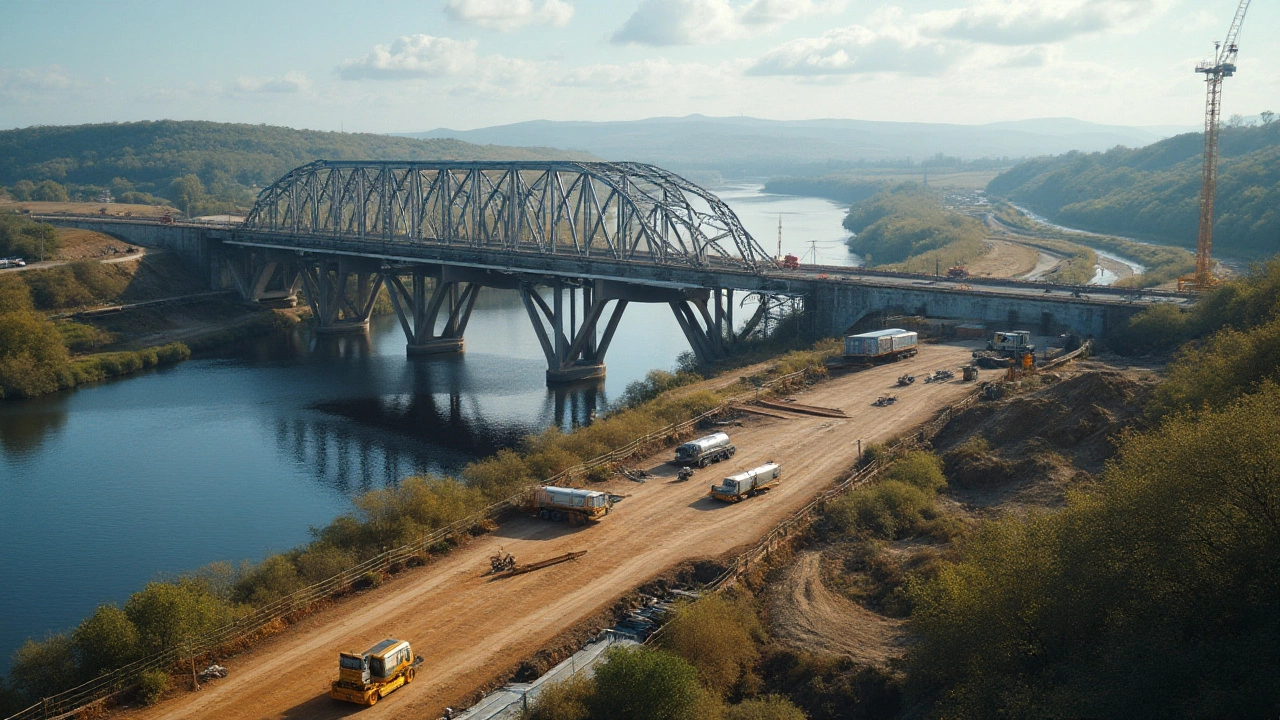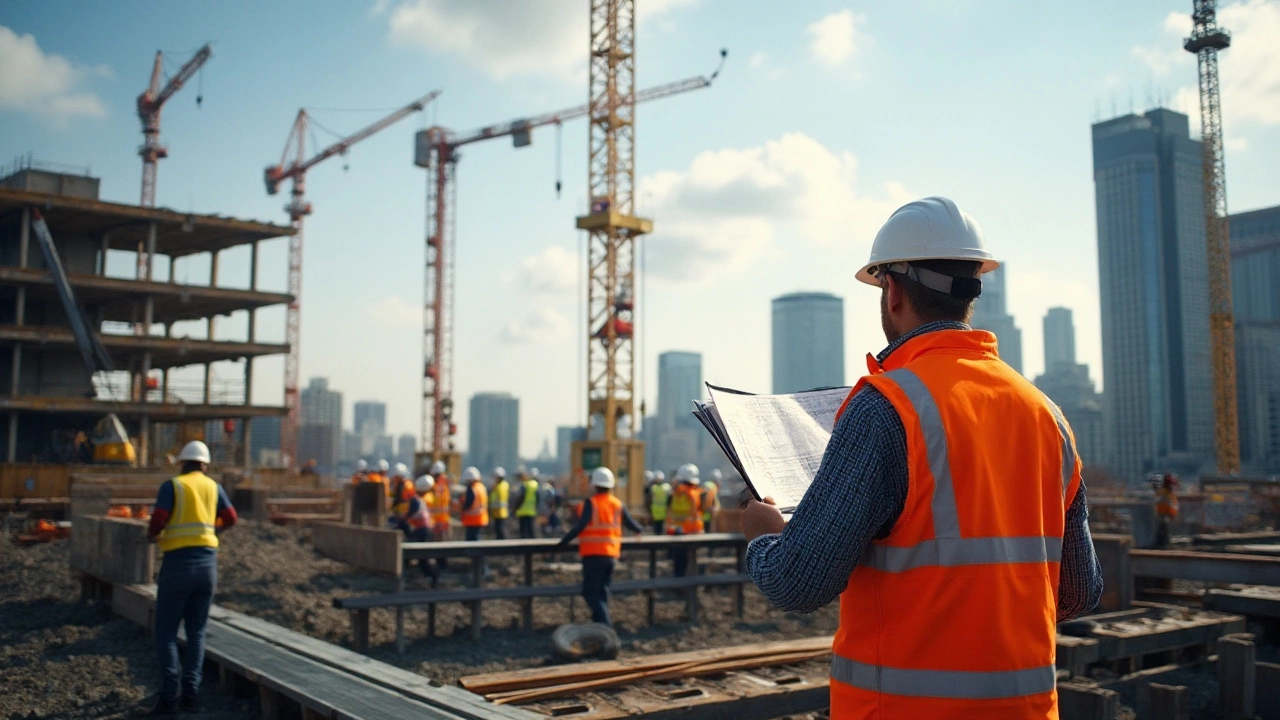In the bustling world of construction, some players stand out due to their size, experience, and influence. These are the Tier 1 contractors, often seen navigating the complexities of massive projects with ease. But what exactly classifies a company as a Tier 1 contractor, and why do they play a vital role in shaping our built environment?
The designation of 'Tier 1' isn’t just about volume; it involves a myriad of qualities and capabilities. From their ability to manage vast resources and coordinate complex operations to their financial stability and proven track record, Tier 1 contractors make significant impacts on projects ranging from skyscrapers to infrastructure developments.
Understanding the unique traits and functions of these industry leaders not only sheds light on their importance but also provides insights for those considering partnerships on substantial projects. Let's delve into the specifics of what makes a Tier 1 contractor stand out and their role in today’s dynamic construction landscape.
- Definition of a Tier 1 Contractor
- Key Characteristics of Tier 1 Contractors
- Responsibilities and Capabilities
- Examples of Projects Handled
- The Importance in the Construction Industry
- Choosing the Right Contractor for Your Project
Definition of a Tier 1 Contractor
Delving into the realm of the construction industry, the term Tier 1 contractor pops up frequently. But what constitutes a Tier 1 contractor? Simply put, these are the industry titans, the seasoned powerhouses managing large-scale projects with extensive resources at their disposal. These contractors are often the go-to for complex and ambitious projects, from urban architecture to massive infrastructure undertakings. A defining hallmark of Tier 1 contractors is not just the size of the operations they manage but their vast experience and capacity to control intricate operations across various domains.
A vital characteristic of Tier 1 contractors is their vast breadth of skilled workforce and assets. Operating on a scale that often dwarfs smaller contractors, they employ hundreds, if not thousands, of specialists ranging from architects and engineers to project managers and construction workers. This robust human capital, combined with cutting-edge technology and equipment, equips them to handle large-scale ventures efficiently. Their operations often extend beyond national borders, taking on international projects that demand impeccable planning and execution to meet global standards.
Financial stability is another defining feature of a Tier 1 contractor. These contractors have strong financial backing, allowing them to absorb significant project costs and risks. This financial robustness empowers them to undertake extensive projects that require substantial investment without compromising quality or timeline. Such economic strength is critical when managing uncertainties and ensuring seamless project delivery, earning them the trust and confidence of stakeholders worldwide.
Many Tier 1 contractors are known for their innovative practices and sustainability initiatives. They lead the industry in integrating technology such as Building Information Modelling (BIM) and off-site construction techniques to increase efficiency and reduce environmental impact. They frequently pioneer sustainable practices, ensuring that their projects not only meet current needs but are also forward-thinking in environmental stewardship. A quote from a study by the Construction Industry Institute notes, "Tier 1 contractors are setting the benchmarks for innovation and sustainable practices, shaping a more resilient and efficient future for the sector."
Despite their large-scale operations, Tier 1 contractors often maintain a strong focus on client relationships and stakeholder management. They offer services beyond construction, including project development and design, to deliver comprehensive solutions tailored to the client's needs. Their ability to manage multiple facets of a project lifecycle makes them invaluable partners in ensuring projects are completed on time and within budget. These aspects make Tier 1 contractors indispensable players in the evolving landscape of global construction.
Key Characteristics of Tier 1 Contractors
When discussing the elite ranks of the construction industry, the conversation inevitably gravitates towards Tier 1 contractors. These are not just big names; they are the movers and shakers responsible for shaping city skylines and national infrastructure. One of the fundamental characteristics of a Tier 1 contractor is their extensive range of resources. From having a large workforce skilled in diverse specializations to possessing an array of heavy-duty equipment, these contractors leave nothing to chance. Their financial prowess is another cornerstone. Unlike smaller firms, Tier 1 contractors have substantial financial backing, sometimes even listed on stock exchanges, ensuring they can handle the economic demands of vast projects.
Diverse expertise marks another crucial trait. Tier 1 contractors aren't pigeonholed into one type of construction; instead, they master various types, including commercial, industrial, and infrastructure projects. This adaptability is essential in managing different project scales and complexities across various geographical locations. According to a report by the
The Engineering News-Record, "Tier 1 contractors are defined by their ability to manage projects that exceed $1 billion in value consistently."Their proficiency in risk management and safety standards ensures they deliver not just on time but with unwavering quality, a non-negotiable aspect in projects like bridges and airports.
Leadership and innovation are also significant attributes. These contractors aren't followers; they lead by introducing cutting-edge technology into their operations, like Building Information Modeling (BIM) and green building techniques. Such innovation keeps them ahead of trends, efficiently solving challenges that stump smaller companies. A deep-seated culture of safety excellence permeates their operations, not just in regulatory compliance but in setting industry benchmarks. They have dedicated teams focused on health and safety protocols which are updated regularly, ensuring the wellbeing of everyone on-site.
Collaboration and strong stakeholder relationships further embellish their profile. Tier 1 contractors have built networks with government bodies, councils, and international collaborators, enabling them to secure high-profile contracts. Their experience in negotiation and extensive legal know-how facilitates this. They often have a transparent communication channel between clients, subcontractors, and suppliers, creating an environment of trust and strong partnerships. This network is pivotal in resource mobilization and timely project execution.
Aside from these attributes, sustainability has become a hallmark of Tier 1 contractors. With increasing emphasis on environmentally-friendly construction practices, these contractors are adopting renewable energy sources and materials with lower environmental impact. They are committed to reducing the carbon footprint of their operations, adopting technologies and practices that support sustainability goals. Often, they lead by example, setting the gold standard for environmentally responsible construction.
Lastly, the portfolio of a Tier 1 contractor speaks volumes. Their experience is reflected in their track record—successful completion of high-stake projects that demand precision and reliability. Whether it's a world-renowned skyscraper or an intricate transport hub, their projects often become case studies in engineering success. This vast experience not only commands respect but also gives them leverage in acquiring new projects, firmly establishing their standing at the top of the construction hierarchy.

Responsibilities and Capabilities
When it comes to the realm of construction, the role of a Tier 1 contractor is as expansive as it is significant. These contractors are often entrusted with complex and high-stakes projects that require a high level of expertise and precision. The responsibilities of these industry leaders span across several dimensions, each as critical as the next. A primary responsibility includes project management at a scale that smaller firms often can’t comprehend. This entails planning, coordinating, and executing massive construction projects that range from skyscrapers to large-scale infrastructure.
Moreover, environmental and safety regulations demand stringent adherence, where Tier 1 contractors excel by ensuring compliance and safety of all involved in and around the project site. These companies are known for their impeccable track record in occupational safety and risk management, often adopting innovative practices to minimize potential hazards. A good Tier 1 contractor will also engage in sustainable building practices, measuring their success not only in terms of financial gain but also by their impact on local communities and the environment.
Financially, Tier 1 contractors handle projects that command enormous budgets. This financial capability allows them to acquire the best resources, machinery, and human capital necessary to complete projects efficiently and effectively. They often work with budget allocations in billions of dollars, rendering them crucial players in national economic development. Their tasks include meticulous cost estimation, budget adherence, and timely delivery, crucial for ensuring project viability and client satisfaction.
As noted by the Construction Industry Institute, "Tier 1 contractors lead the way in fostering innovation and efficiency in the construction sector, setting benchmarks in project delivery and management."
A critical capability of these top-tier contractors is their ability to engage and manage a workforce that might number in the thousands, across multiple sites. This requires not just leadership but operations and logistics excellence. In terms of technology adoption, Tier 1 contractors are at the forefront, employing cutting-edge tech like BIM (Building Information Modeling) to streamline operations and enhance accuracy. They often spearhead technological advancements in construction, using digital solutions to optimize project execution and track progress meticulously.
Another dimension of their capability is their extensive network of subcontractors and partners, which allows them to leverage specialized skills and knowledge as required by unique project demands. These relationships are built on trust and reliability over years of collaboration, ensuring that every facet of a project is handled by seasoned experts. This breadth of connection makes them flexible and adaptive, able to scale their operations up or down in response to the immediate needs of a project.
Examples of Projects Handled
When talking about Tier 1 contractors, it is crucial to understand the monumental projects they take on within the construction landscape. These contractors are often tasked with bringing intricate visions to life in the form of iconic structures and transformative infrastructure projects. One prime example would be the construction of skyscrapers, the towering giants that define city skylines. A firm recognized as a Tier 1 contractor might work on the delivery of a high-rise building, ensuring it not only meets architectural aesthetics but also rigorously adheres to safety and sustainability standards, which are tantamount to modern engineering ethics.
It's not unusual for Tier 1 contractors to be associated with large infrastructure projects, such as highways and bridges that demand extensive resource coordination and technical expertise. A case in point could be the famous 'Crossrail' project in London, a complex underground railway spanning over 100 kilometers. Managed by a consortium including Tier 1 contractors, this project exemplifies the need for meticulous planning and execution, tackling challenges like urban density, geological surprises, and political scrutiny. A
great leader within the construction industry once mentioned, "Building the tracks under an old city, connecting modern needs with heritage, requires not just skill, but vision."These words underscore the challenge and prestige associated with such ventures.
Iconic Stadiums and Arenas
Tier 1 contractors are often seen behind the creation of world-renowned stadiums and arenas that host major international events. The construction of the Allianz Arena in Munich, for instance, was spearheaded by an elite Tier 1 company, showcasing their ability to blend innovative design with audience safety and comfort. These projects demand cutting-edge technology and precision, from the bespoke seating arrangements to the state-of-the-art pitch management systems. Not only do such projects uplift the stature of the contractors, but they also add substantial value to the community and the nation's economic prowess.
Another critical area is the development of smart city initiatives, where Tier 1 contractors lead the charge in creating digitally interconnected urban areas. Imagine a sprawling project where every piece of infrastructure communicates seamlessly. In these endeavors, such as projects in Singapore, contractors apply futuristic technologies, including IoT, to enhance urban efficiency and sustainability. By embedding sensors and smart traffic systems, they essentially lay the groundwork for cities of the future.
| Type of Project | Example | Location |
|---|---|---|
| Skyscraper | Burj Khalifa | Dubai, UAE |
| Railway Infrastructure | Crossrail | London, UK |
| Stadium/Arena | Allianz Arena | Munich, Germany |
| Smart City Development | Smart Nation | Singapore |
Clearly, the volume and variety of projects managed by Tier 1 contractors highlight their critical role in shaping contemporary societies. They don't just build, they innovate, turning dreams into reality on a grand scale. Whether it’s through erecting iconic structures or crafting the infrastructure that binds our cities together, they stand at the forefront, ushering in new possibilities with every project undertaken.

The Importance in the Construction Industry
The construction industry is an ever-evolving landscape, constantly demanding higher efficiency, creativity, and robust execution strategies. In this intricate puzzle, Tier 1 contractors hold a significant place owing to their ability to bring sweeping changes with their resources and expertise. These contractors typically lead the charge on monumental projects that often dictate the course of urban development. Their role in the industry is crucial because they not only handle complex operations but also stimulate economic growth, provide employment, and support innovation in building technology.
One might wonder what makes Tier 1 contractors truly indispensable to the industry. The answer lies in their skillful management of resources, both human and material. They are capable of mobilizing large teams and equipment needed to deliver massive projects on time and within budget constraints. Additionally, their financial strength allows them to weather uncertainties and setbacks that would overwhelm smaller firms. This reliability and consistency make them the go-to for government contracts and hefty private sector deals alike. They also act as innovators, often investing in advanced technology solutions that streamline construction processes and make sustainable practices a reality.
Tier 1 companies also serve as the industry's backbone, setting standards and benchmarks for quality and safety. Their involvement in mega-projects means they must adhere to strict regulations while ensuring the highest levels of safety for workers and the public. This requirement has led many Tier 1 firms to develop comprehensive safety programs and protocols, which often become models for others in the industry.
As construction analyst John Calder famously said, "The standards set by the leaders become the benchmarks for the industry, pushing everyone towards excellence."This influence permeates all levels of construction businesses, stretching the capabilities and ambitions of smaller firms that aspire to rise in the ranks.
Moreover, the ripple effect of these companies extends into community development. By undertaking projects like new schools, hospitals, and sustainable housing, they directly contribute to improving the quality of life for many. They help shape the very infrastructure that supports society, from the roads we travel on to the buildings where we work and live. Their projects often involve an array of subcontractors and suppliers, summing up to hundreds, if not thousands, of jobs created on a project-by-project basis. This wide-reaching impact underscores the vital role of Tier 1 contractors in balancing development with community welfare.
Lastly, aligning with their vast scope, Tier 1 contractors often find themselves at the forefront of addressing environmental concerns. Many of these companies have adopted green building practices and technology to minimize their carbon footprint and promote sustainability. By investing in eco-friendly materials and energy-efficient designs, they are setting the precedent for environmentally-conscious construction. The integration of green practices is not just a nod to environmental responsibility but also showcases them as leaders paving the way for the industry's future.
In essence, the importance of Tier 1 contractors in the construction industry cannot be overstated. They not only bring the capability and expertise needed to tackle large projects but also carry a greater responsibility towards safety, community, and the environment. Given the complexity of today's construction demands, their role is more significant than ever as they continue to help shape the urban landscape in ways that are efficient, innovative, and responsible.
Choosing the Right Contractor for Your Project
Choosing the right contractor for your construction project can be akin to selecting a lifelong partner. It requires diligence, understanding, and a clear vision of your goals. The presence of Tier 1 contractors in the market often adds another layer of complexity to this decision-making process. The size and scope of their projects can be daunting, but with the right approach, working with such industry leaders can transform your vision into reality.
To start, assess the scale and requirements of your project. Is it a massive infrastructure development or a high-rise that shapes the skyline? Tier 1 contractors are equipped for such colossal undertakings due to their extensive experience and resources. Their portfolios often showcase vast arrays of construction undertaken across several sectors. Engage with potential contractors by requesting their project portfolios and a list of references. Gain insights from past clients about their experiences, which can offer a clearer picture of their reliability and execution capability. An established track record of delivering on time and within budget is crucial.
Understanding the financial stability of a Tier 1 contractor is another significant factor. These firms usually operate on large budgets and long timelines, making financial health critical. A reliable contractor should provide transparency regarding their financial standings and insurance coverage. Often, their ability to secure large contracts is contingent on their financial robustness, which in turn protects you from disruptions caused by cash flow issues. They might also offer better terms due to their negotiation power.
Communication and Collaboration
Communication skills and the ability to effectively collaborate cannot be overlooked when selecting your contractor. Are they attuned to your ideas and concerns? A Tier 1 contractor should have a dedicated point of contact to ensure seamless communication and collaboration. This involves regular meetings, updates on progress, and detailing project milestones and expectations. Look for indicators that the contractor values your input and encourages a two-way dialogue, fostering a solution-oriented mindset. This relationship can make or break the project’s success.Beyond these, consider any specialized expertise that may benefit your project. Some contractors may have a track record with specific types of technology, sustainable practices, or innovative construction methodologies. This might be particularly beneficial if your goal is to integrate contemporary solutions into your build. Additionally, aligning on vision can set a strong foundation for smooth execution. Kevin Zhang, a renowned architect, once said,
"The success of a project lies not just in the plan but in the synergy between the vision and the realization."
If the project's specific requirements coincide with a contractor's area of expertise, it can enhance efficiency and outcomes. Finally, always conduct formal interviews and site visits to see their operations firsthand whenever possible. Meeting the team and observing their workflow can provide insights beyond what's depicted in proposals and presentations. In today's dynamic construction landscape, choosing a contractor is not just a transactional decision but a strategic partnership that can determine the reality of your built environment.





